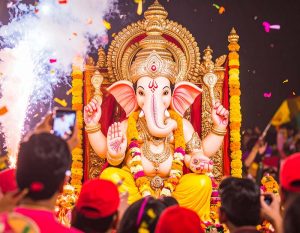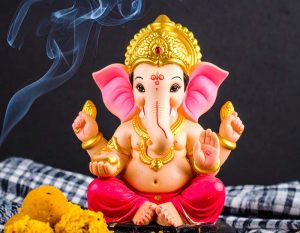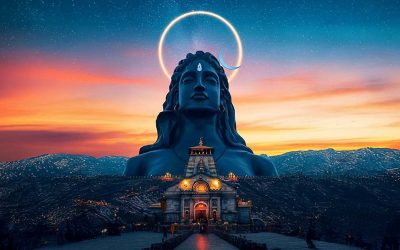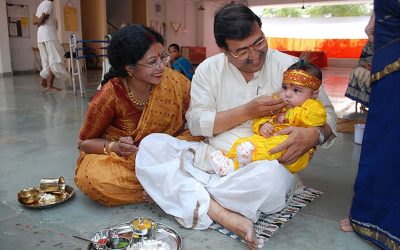Why Is Lord Ganesha So Important and Why Is Ganesh Puja Performed First?
Lord Ganesha is the beloved elephant-headed deity. He holds a special place in Hindu tradition. Well known as the remover of obstacles and the god of beginnings, his name is taken by devotees at the start of any work, ceremony, or prayer.
But why is Lord Ganesha so important, and why is Ganesh Puja always performed first in rituals? Let’s explore the more profound spiritual significance behind this tradition.
The Importance of Lord Ganesha

- The Remover of Obstacles (Vighneshvara)
Ganesha is most widely known as Vighneshvara or Vighnaraja. He is the one who clears obstacles from the path of devotees. Physical, mental, or spiritual challenges? Invoking Lord Ganesh helps you make smoother progress. That is why at the beginning of journeys, business ventures, or even personal milestones, his blessing is sought after. - The God of Intellect, Wisdom, and Learning
Lord Ganesha symbolizes clarity of thought and sharp intelligence. He is the patron of arts, sciences, and literature. Students, writers, and creative thinkers often pray to Ganesha for insight and inspiration before beginning their work. - The God of New Beginnings
Have more success and begin your new project, ceremony, or even daily activity with Lord Ganesha’s grace. In every puja, from weddings and housewarmings to writing and learning, he blesses beginnings with positivity and protection. - Universally Revered Across Traditions
Born of Shiva and Parvati in the Shaivite tradition, Lord Ganesha’s reverence knows no boundaries. His presence flows across paths of Vaishnavism, Smartism, Buddhism, and Jainism. He stands as one of the most beloved deities not only in India, but in the hearts of people across the world.
Why Ganesh Puja Is Performed First
- To Remove Obstacles and Secure Success
No ritual ever really feels complete without first calling on Lord Ganesha. People believe that when you worship him, he clears away unseen hurdles and makes sure everything goes smoothly. It’s like he ‘opens the door first,’ so no obstacle gets in the way of your prayers. - Awakening Consciousness
When you start with Ganesh Puja, it’s like aligning your mind and spirit to a higher state. That little shift brings clarity, helping you step into rituals with focus, devotion, and a calm heart. - Guardian of Directions (Disha-nayaka)
In some traditions, Ganesha is considered the guardian of the ten cardinal directions. Without his blessing, rituals may falter due to unseen energies. Offering prayers to him first ensures divine protection from all sides. - Symbolic Invitation in Rituals
Ganesh Puja marks the first divine invitation extended during sacred ceremonies. Before invoking Vishnu, Lakshmi, or even ancestral deities, Ganesha is remembered to sanctify the space. This order reflects his role as the deity of beginnings and auspiciousness.
Here is a summary- 
- Importance: Lord Ganesha is the god of wisdom and learning. He also helps remove obstacles and blesses new beginnings.
- Why First in Puja: We pray to Ganesha first because he clears the way, wakes up our mind, protects us from all sides, and makes sure the puja goes smoothly.
Worshipping Lord Ganesha first is more than just a ritual; it is an act of spiritual preparation. By invoking his blessings, devotees seek not only protection from obstacles but also wisdom, clarity, and auspicious beginnings. Every prayer, every venture, and every journey becomes more meaningful when it starts with the grace of Lord Ganesha.
FAQs About Lord Ganesha and Ganesh Puja
Q1: Why is Lord Ganesha called the remover of obstacles?
Ganesha is believed to clear both visible and unseen barriers in life, helping devotees move forward smoothly in their endeavours.
Q2: Why is Ganesh Puja performed before other deities?
Because Ganesha symbolizes beginnings and protection, his worship ensures that the rest of the ritual proceeds without hindrance.
Q3: Can Ganesh Puja be performed at home?
Yes. Many families start daily prayers, new ventures, or festivals like Diwali and Ganesh Chaturthi with Ganesh Puja at home.
Q4: Is Lord Ganesha worshipped outside Hinduism?
Yes. Ganesha is also revered in Buddhism and Jainism, and his symbolism of wisdom and prosperity is recognized globally.
Q5: What lesson does Lord Ganesha’s broken tusk teach us?
It symbolizes sacrifice, dedication, and the idea that imperfection can lead to great wisdom and creativity.






